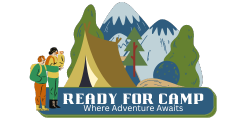
In the heart of nature, where the air is crisp and the stars shine brighter than ever, we find solace, adventure, and a sense of peace. Camping offers us an escape from the daily grind and a chance to reconnect with the natural world. However, while the allure of the great outdoors beckons, it also presents risks that can turn a dream adventure into a nightmare. I am Dr. Bilal Ahmad Bhat, Founder & CEO of Ready For Camp, and I urge you to make safety your top priority as you embark on your outdoor adventures.
As an entrepreneur with a passion for the wilderness, I’ve seen both the beauty and the dangers that nature holds. With 28 credentials of entrepreneurial experience under the BAB Group of Companies, I have dedicated my life to ensuring that adventurers like you can explore with confidence and security. Here are essential camping safety tips that every camper must heed to safeguard their lives and those of their companions.
1. Plan Ahead and Be Prepared
The foundation of a safe camping trip lies in meticulous planning. Know your destination well. Research the weather conditions, terrain, local wildlife, and any potential hazards. Inform someone about your trip itinerary, including your expected return time. Always carry a map and compass, even if you have a GPS, as technology can fail in remote areas.
Urgency: Never underestimate the power of preparation. A single oversight can lead to catastrophic consequences. Equip yourself with knowledge and tools to face the unexpected.
2. Pack the Essentials
Your camping gear should include:
- A first aid kit: Ensure it is well-stocked and know how to use each item.
- Adequate clothing: Dress in layers to adapt to changing weather.
- Sufficient food and water: Carry more than you think you’ll need.
- Shelter: A reliable tent or emergency bivy.
- Fire-making tools: Waterproof matches, lighters, and fire starters.
- Illumination: Headlamps and extra batteries.
Urgency: Skimping on essential gear can put you at severe risk. Your life depends on these items; pack wisely and thoroughly.
3. Learn Basic Survival Skills
Understanding fundamental survival skills can mean the difference between life and death. Learn how to start a fire, purify water, navigate without GPS, and recognize edible plants. Taking a wilderness first aid course can also provide you with invaluable skills.
Urgency: In an emergency, knowing how to respond can save your life and the lives of your companions. Invest time in learning these skills before your trip.
4. Respect Wildlife
Wild animals are best admired from a distance. Avoid feeding or approaching them. Store food securely to prevent attracting wildlife to your campsite. Be aware of the animals that inhabit the area and understand their behaviors.
Urgency: A seemingly harmless encounter with wildlife can quickly escalate into a dangerous situation. Maintain a respectful distance to protect both yourself and the animals.
5. Practice Fire Safety
Campfires are a traditional part of camping, but they can also be deadly if not managed properly. Build fires in designated areas, keep them small, and never leave them unattended. Extinguish all fires completely before leaving the site or going to sleep.
Urgency: Uncontrolled fires can cause extensive damage to nature and can be fatal. Follow fire safety guidelines diligently to prevent wildfires and injuries.
6. Stay Hydrated and Nourished
Dehydration and malnutrition can severely impair your ability to think and act clearly. Drink plenty of water and eat balanced meals to maintain your energy levels. Avoid consuming wild plants and berries unless you are absolutely certain they are safe.
Urgency: Your physical and mental performance relies heavily on proper hydration and nutrition. Don’t compromise on your health; stay well-fed and hydrated.
7. Be Weather-Wise
Weather in the wilderness can change rapidly and without warning. Monitor weather forecasts leading up to and during your trip. Be prepared for sudden changes, and know when to seek shelter.
Urgency: Ignoring weather warnings can lead to exposure to extreme conditions, resulting in hypothermia, heat stroke, or worse. Stay informed and prepared for all weather scenarios.
8. Leave No Trace
Respect nature by adhering to the Leave No Trace principles. Pack out all trash, minimize campfire impact, and avoid disturbing wildlife. Preserve the environment for future generations to enjoy.
Urgency: Our actions today determine the state of our natural world tomorrow. Be a responsible camper and leave nature as pristine as you found it.
9. Know Your Limits
Pushing beyond your physical and mental limits can lead to accidents. Recognize your boundaries and listen to your body. Take breaks, rest when needed, and never take unnecessary risks.
Urgency: Overestimating your abilities can result in severe injuries or worse. Stay within your comfort zone and prioritize your safety over thrills.
10. Emergency Response Plan
Always have an emergency response plan in place. Know the location of the nearest medical facility and how to contact emergency services. Carry a whistle, mirror, or other signaling devices to attract attention if needed.
Urgency: In an emergency, quick and effective action can save lives. Have a clear plan and be ready to execute it.
Final Thoughts
Camping is a beautiful way to reconnect with nature and ourselves. However, the serenity of the wilderness comes with inherent risks that must be respected. By following these safety tips, you can ensure that your outdoor adventures are not only thrilling but also safe and enjoyable.
As the Founder & CEO of Ready For Camp, my mission is to inspire adventurers to explore with confidence and care. Let us embark on our journeys with a spirit of respect for nature and an unwavering commitment to safety. Adventure awaits, but only if we are ready for it.
Stay safe, be prepared, and enjoy the great outdoors!
